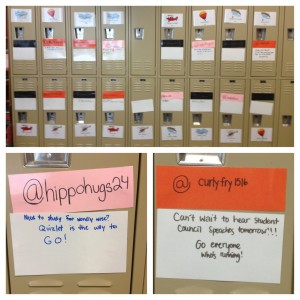I’m new to the whole “tweeting” thing this year, and I have to admit, I wasn’t eager to adopt this new form of social media for my classroom. One, I’m a terribly verbose person. Writing in 140 characters max? That’s an entirely new skill set. My progress reports are books, and my emails to parents are long and detailed. And it isn’t because I’m trying to be an over-achiever. I’ve just always found it much easier to write everything that comes to my mind, and a lot comes to my mind. My second issue with Twitter was similar to my issue with photography. I don’t really like to stop what I’m doing to tell everyone or capture what I’m doing. I’ve never posted a Facebook status and despite having Instagram, don’t ever post pictures. I love following other people, but I don’t leave much of a trail myself. Would I just stop teaching every now and then to tweet? I wasn’t sure what it would look like for me. However, the rest of my team decided to have classroom twitter pages, so I decided to get on board and give it a shot. Ironically, it has it turned into one of the best parts of my classroom this year, not just for me, but more importantly for my students.
As soon as I showed my students our class Twitter feed (@johnston5th), they were all in. I get questions daily about how many followers we have, how “famous” they are as their pictures go up, and of course, how many followers Jill Gough (@jgough) has now since she retweets many of our posts. As a result of their interest and enthusiasm, I allowed my students to create their own twitter handles and “whiteboards” for their lockers where they could “tweet” to the class. As I posted some of these “tweets” on Twitter, Jill Gough connected me with another teacher, Philip Cummings (@philip_cummings), who introduced me to the idea of a Chief Tweeting Officer (http://goo.gl/l0h2lx) in the classroom. Because of positive feedback and the connections made through Twitter, the students are well on their way to crafting their own tweets for our real classroom account.
When we started the process, the students were excited about writing tweets but wondered why anyone on Twitter would care what they said or thought. In their mind, my tweets were “grown-up” and interesting to all of our followers, but their tweets wouldn’t be. What would they say? Why would their voice matter? While I’ve come to love the professional learning community on Twitter, I would argue that the students’ voices are equally, if not more important in some ways, than ours. The students are the heart of education. They are the “client” and the voice that ultimately reflects our education system. Why should I be the only one reflecting our learning? Why should I be the only one that hears what they’re excited about and latching onto in the classroom? What can other teachers and students learn from hearing children who aren’t in their classroom?
To prepare for a Chief Tweeting Officer, we’ve been practicing different types of tweets on paper to get used to what a tweet looks and sounds like. Despite thinking they had nothing to say, they immediately started coming up with more meaningful tweets than I ever expected. In fact, I’ve learned volumes about what they take away from our classes just by reading their tweets. Here is just a sample of some of their tweets from the first two days of practice:
Working on fairytales and connections with Sisters Grimm. Which ones are your favorites? #trinitylearns ES
Wordly Wise reminds us how many words are out there that we haven’t even heard of. #trinitylearns ES
Today we are doing the 12 minute run. I am ready to push myself! #trinitylearns HH
River Kids reminds me of a water sample class at my camp in Maine. #trinitylearns AM
Measuring our step length in math. I wonder how many steps per mile? #trinitylearns AG
I had so much fun in the creek today at science. I saw 4 newts and a leopard frog! #trinitylearns PR
Preparations for Camp Will-a-Way starts today! Can’t wait to go! #trinitylearns SS
In math we measured our steps. Surprisingly I have the small steps! #trinitylearns LN
I wonder what’s in the science shed. #trinitylearns CK
Doing River Kids boot camp was so fun! It reminds me of when we went exploring in 3rd grade. #trinitylearns MS
I’m so proud of my math test score. #trinitylearns BL
What a window into our students’ minds! Do I still struggle to write in 140 characters or less? Yes. Am I still verbose? Yes, just look at this post! Do I sometimes miss or ignore “tweetable” moments? Yes. But those struggles are outweighed by the incredible learning that is happening on Twitter for both my students and me. If our purpose is to share and learn from each other, then our students should be a part of that community too. Keep an eye out for our students tweeting and sharing their learning beyond the walls of our classroom!
Learner, Thinker, Writer: Ashley Johnston teaches Fifth Grade language arts and social studies at Trinity School. @johnston5th


